This article was first published by The Times of Israel and was re-posted with permission.
Prostate cancer is the second most common cancer in American men after skin cancer, with almost 190,000 new cases in the US expected for 2016 and about 26,000 deaths, according to the American Cancer Society. It is also the second leading cause of cancer death in American men, behind only lung cancer.
SEE ALSO: To Stop Cancer From Spreading: Shoot The Messenger
Prostate cancer can often be detected before symptoms arise by testing the amount of prostate-specific antigen (PSA) — a substance made by cells in the prostate gland — in the blood. A high level of PSA could be indicative of cancer and if a blood test finds this, the patient will most often be sent for a biopsy.

Lung cancer cell dividing. The two daughter cells are only held together by a very thin bridge of cytoplasm. Scanning electron micrograph. B0006883 Lung cancer cells. Photo by Anne Weston, LRI, CRUK. Wellcome Images
But here lies the problem. Because PSA is secreted both by normal cells and cancer cells, its levels could be high for other reasons and not necessarily cancer: age, an inflammation of the prostate gland, or even a bicycle ride. But most often when doctors receive a high reading, they send their patients to do a biopsy, just to be on the safe side.
“There are roughly 1.5 million primary biopsies done in the US a year,” says Israel-born Arnon Chait, the CEO of Cleveland Diagnostics, based in Cleveland, Ohio. “On average 70 percent come back negative.” That is good news for the patient, but at a cost of about $4,000 per biopsy, health providers are not happy.
SEE ALSO: Harmless? Herbal Medicines Could Interfere With Life-Saving Cancer Treatments
Thus Cleveland Diagnostics (CDX), founded by Chait and his partner Boris Zaslavsky in 2013, is developing a technology and test kit that can identify the PSA that specifically comes from cancer cells. “We don’t look at the level of PSA in the blood – which is not specific to cancer,” Chait said. “Our test asks: where did this PSA come from, normal cells or cancer cells? This will help health providers save billions of dollars and patients won’t have to undergo unnecessary procedures.”
Potentially, said Chait, the new IsoPSA test, expected to enter the market in the last quarter of the year, could replace the current PSA test in the screening process in health centers. This same technology could also be used in other applications, to detect breast cancer and ovarian cancer, Chait said, as well as for early diagnosis of Alzheimer’s disease.
To read the full article, click here.
Related posts

Israeli Medical Technologies That Could Change The World

Harnessing Our Own Bodies For Side Effect-Free Weight Loss

Missing Protein Could Unlock Treatment For Aggressive Lung Cancer




Facebook comments